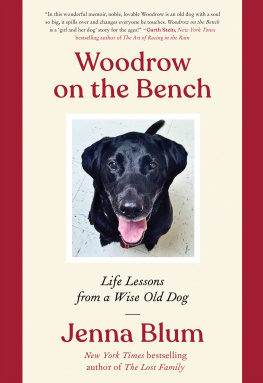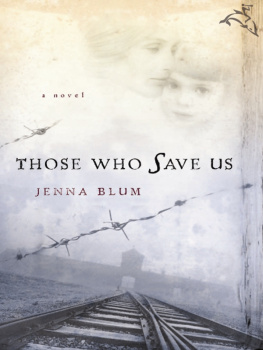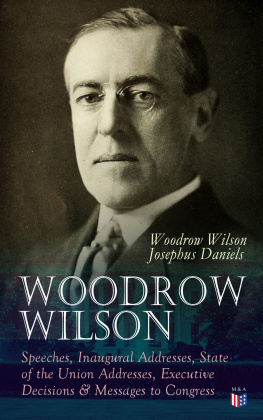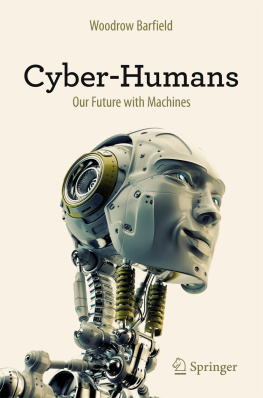For Woodrow.
And for anyone whos ever loved an old dog.
Contents
The bench is across the street from my apartment, on a greenway called the Commonwealth Mall that runs from Bostons Public Garden down to Fenway. The Mall striates Commonwealth Avenue like the divider in the middle of Park Avenue in New York City, rendering the street double-wide. Except the Mall has more trees, old-growth oaks and cottonwoods shading it in a gracious canopy. And historical statues on every block: Abigail Adams, Alexander Hamilton, and, on our block, patriot of the Revolution John Glover.
Like any city park, the Mall is lined with benches. Nothing special. Weather-beaten wood supported by curlicued black iron. Some of them have plaques next to them, commemorating people who once loved to sit there. T O G INGER, MY CHAMPAGNE LADY, FOR ALL THE SUNSETS . F OR F RED, A FRIEND FOR EVERY SEASON.
Our bench, Woodrows and mine, has no plaque. It has nothing remarkable about it at all. Its just in closest proximity to where I live, opposite my front door. When I first move into my Back Bay brownstone in 2008, I pay no attention to the bench. I dont even notice it. I have no idea that, eleven years later, when my black Lab Woodrow, then four, has reached the extraordinary age of fourteen, that bench will be our daily destination. Twice a day, in fact.
Now, morning and night in all weathers we will head there, and Woodrow, who can go no farther, WHUMPS down in a patch of dirt his body has made in the grass next to the bench, and it will become our oasis. Neighbors will find us there, and friends and strangers, and I will be a sitting duck for conversation. I will try to work on my iPad and find it impossible. Woodrow will draw people to us like a magnet. The bench, his favorite place, will change my life.
I n October 2004, my boyfriend suggested we take a day trip. We hopped in my Jeep and drove south out of Boston, toward the Cape. It wasnt unusual for us to do this, to explore the playground of New England, and it was the perfect time for it: the air crisp and cool, the sun still bright, the trees just starting to change into their gold and orange and maroon clothes against the bright-blue sky.
What was unusual was that Andy took an exit before the Sagamore Bridge, toward Duxbury. Where are we going? I asked.
Youll see, he said.
He drove along a winding road bordered by old stone walls, fields, and thickets of trees. Across from a cranberry bog, where thousands upon thousands of berries bobbed in navy-blue water, he pulled into a long driveway leading to a small house with a barn behind it. A saltwater farm? There was a deep-green lawn beneath big old trees, and on the grass, encircled by one of those expandable wooden playpens, tumbled seven Labrador retriever puppies. Five yellow, two black.
Oh! I said, opening my door to scramble out before the Jeep had even completely stopped.
I thought wed just look, Andy said.
Of course, nobody ever just looks at a Labrador puppy. We climbed into the playpen circle and let them bounce all over us, licking us with their tiny puppy tongues, huffing their coffee-smelling puppy breath on our faces, chomping us with their tiny needle teeth. They were so young that they still had their gosling fluff instead of actual fur; their tails had candlewick twists on the ends; their bellies were soft and white and roly-poly, reminding me of one of my favorite Little Golden Books from childhood: The Poky Little Puppy.
I want one! exclaimed my mom, when I texted her grainy photos from my flip phone. Lets take the brothers.
The brothers were the two black males. By the time we left an hour later, I had put down a deposit on both, one for me, one for my mom. The breeder tattooed the inside of the pups ears so we could tell the boys apart.
That was how Woodrow, 01, the more alpha of the two brothers, came to me.
I had not intended to get a dog. It wasnt a good time: Andy had only just moved in, our apartment on Beacon Hill was the size of a postage stamp, I was working as an adjunct writing professor, and I was about to launch my first book. Then again, as people sometimes say about getting pregnantor, in my moms case, quitting smokingits never a good time to get a dog. You might as well dive right in. And who could resist those puppies?
Plus, I was predilected. Dogs were in my familys DNA. A photo of my moms great-grandmother Genora, in rural Minnesota, shows a lady in stylish furs, hat, and button-up high-heeled bootswith a square-headed black Lab sitting at her feet. On my dads side, the legendary and stalwart black Lab Guy was the star of all his childhood memories. My first dog predated me: my moms cocker spaniel Vivo, a gorgeous, honey-colored AKC champion who loved to hide beneath thingsmy crib, the Christmas tree, my moms pianoand attack anyone who came near. The day Vivo, blind and deaf, was scheduled to be taken to the vet to be put to sleep, my dad, who had a long-running feud with the dog, reached down to pet him one last time. Goodbye, old boy, he said tearfully. Vivo snarled and bit his hand. Well, the hell with you, my dad said. After that, we had Labs.
Our house in the commuter suburb of Montclair, New Jersey, was a kind of Lab farm when I was growing up. At one point we had three full-grown retrievers banging around: Booda, who was dumb but sweet, with such a bad overbite that seen from below his mouth looked like the sharks on the cover of Jaws; Buddy, an elegant, intelligent yellow Lab who posed on Oriental rugs, ate Hagen-Dazs ice cream, and led poor dumb Booda astray, coaxing him into leaving the yard and then abandoning him on unfamiliar streets; and Gus, who was 120 pounds of pure untamed muscle and who, when the doorbell rang, would pick up the nearest objecta tennis racket, a hammer, a lampand charge the visitor with it.
You might think that after all this I might not want a Lab of my own, but eight weeks after we saw the pups, we returned to the little farm by the cranberry bog, and the Jones boys, as we called themWoodrow Jones and Smarty Jonescame home with us. My mom took Smarty to Florida. Woodrow stayed with me. Thus began the most durable love affair of my life.
It was not easy at first. Woodrow, like many puppies, was like Helen Keller preAnnie Sullivan. He ravaged the apartment. He tore round and round in circles. He jumped on me, ceaselessly, while I tried to write, while I frantically googled How to make puppy stop jumping. He ate a whole rawhide bone as big as his body in two minutes, causing me to then google Can puppy die from eating whole rawhide? One weekend I called Andy, who was in New Hampshire with his son, in tears. I said, I feel like Im babysitting somebody elses monster child. I dont want him. Theres something wrong with him. Lets take him back.
But Woodrow, though willful, was supersmart, and once he realized I was also stubborn and, as the human, at least nominally the alpha, he gave in and grudgingly let me train him. He came. He sat. He dragged me up and down the ice-covered slopes of Beacon Hill several times a day, back and forth to the dog park on the Common, strangulating himself to get to the joyous open space. In the summer, as he grew, we started running by the Charles, Woodrow a few paces ahead of mea dogs walking pace is a humans jogging onethe tips of his ears jauntily flapping. And although we had agreed not to let Woodrow on any of the furniture! Never! Ever! Especially on the bed!, one afternoon Andy came home from work and caught me napping with Woodrow next to me, the dogs head on my pillow. The look Andy gave us could not have been more gravely disappointed if he had caught me with another man.
Over the next several years, many things happened. I published that first book. I went on tour. It was successful. We moved out of the postage-stamp apartment on Beacon Hill and into a bigger place across the Public Garden in the Back Bay. There was another novel. Another tour. Another teaching job. Andy and I split up. There was another boyfriend, then anotherthe men came and went, like the women in the room in T. S. Eliots The Love Song of J. Alfred Prufrock. Woodrow, however, did not go. While everything else changed, and went, he stayed.













